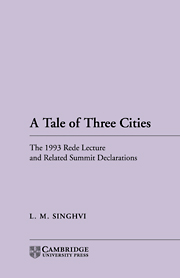The Rio Declaration on Environment and Development
Published online by Cambridge University Press: 16 October 2009
Summary
The United Nations Conference on Environment and Development, having met at Rio de Janeiro from 3 to 14 June 1992, reaffirming the Declaration of the United Nations Conference on the Human Environment, adopted at Stockholm on 16 June 1972, and seeking to build upon it, with the goal of establishing a new and equitable global partnership through the creation of new levels of cooperation among States, key sectors of societies and people, working towards international agreements which respect the interests of all and protect the integrity of the global environmental and developmental system, recognizing the integral and interdependent nature of the Earth, our home, proclaims that:
Principle 1 Human beings are at the centre of concerns for sustainable development. They are entitled to a healthy and productive life in harmony with nature.
Principle 2 States have, in accordance with the Charter of the United Nations and the principles of international law, the sovereign right to exploit their own resources pursuant to their own environmental and developmental policies, and the responsibility to ensure that activities within their jurisdiction or control do not cause damage to the environment of other States or of areas beyond the limits of national jurisdiction.
Principle 3 The right to development must be fulfilled so as to equitably meet developmental and environmental needs of present and future generations.
Principle 4 In order to achieve sustainable development, environmental protection shall constitute an integral part of the development process and cannot be considered in isolation from it.
- Type
- Chapter
- Information
- A Tale of Three CitiesThe 1993 Rede Lecture and Related Summit Declarations, pp. 1 - 4Publisher: Cambridge University PressPrint publication year: 1996

